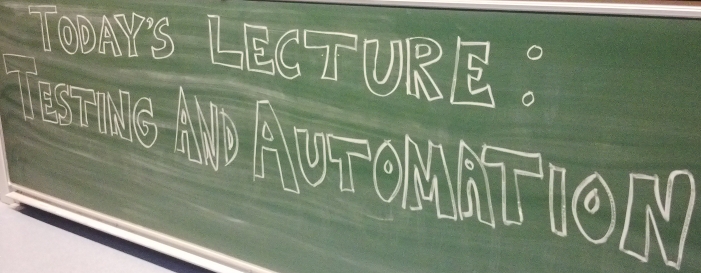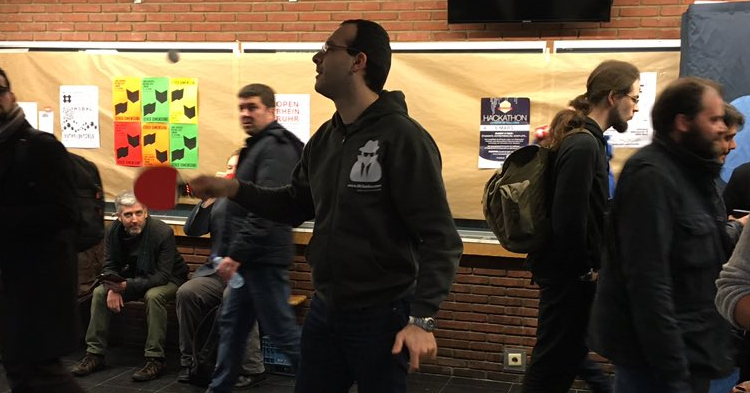Hello everyone, this year I've been to FOSDEM again. Here is a quick report of what I did, saw and liked during the event.
Day 0 - Elixir & Erlang
Friday started with an unexpected shopping trip. The airline broke
my luggage and I had to buy a replacement. The irony is that just before taking off
I saw a guy with an
Osprey Meridian
and thought how cool that was. The next day I was running around Brussels to
find the exact same model! I also searched to buy the book
Teach Your Child How to Think
by Edward De Bono but all 4 bookstores I checked were out of stock.
With the luggage problem solved I headed to BetaCowork for Brussels Erlang Factory Lite where I learned a bit about Erlang and Elixir. I also managed to squeeze a meeting with Gilbert West talking about open source bugs.
I found particularly interesting the Elixir workshop and the talk Erlang In The Wild: A Governmental Web Application by Pieterjan Montens. Later I've managed to get a hold of him and talk some more about his experiences working for the government. As I figured out later we are likely to have mutual friends.
BetaCowork was hosting FOSDEM related events during the entire week. There was a GNOME event and the Libre Office Italian team was there as well. Next time definitely worth a longer visit.
Friday night was reserved for a dinner with the Red Hat Eclipse team and a fair amount of beer at Delirium afterwards where I've met my friend Giannis Konstantinidis and the new Fedora Ambassador for Albania - Jona Azizai.
All-in-all pretty good Friday!
Day 1 - Testing and Automation

FOSDEM was hosting the Testing and automation devroom again. I've spent the entire Saturday there.
Definitely the most interesting talk was Testing interoperability with closed-source software through scriptable diplomacy which introduced Frida. Frida is a testing tool which injects a JavaScript VM into your process and you can write scripts driving the application automatically. It was designed as means to control closed source software but can definitely be used for open source apps as well.
I've talked to both Karl and Ole about Frida and my use-case for testing interactive terminal programs. That should be easy to do with Frida - just hook into the read and write functions and write some JavaScript or Python to run the test. Later we talked about how exactly Frida attaches to the running process and what external dependencies are needed if I'm to inject Frida into the Fedora installation environment.
In Testing embedded systems Itamar Hassin talked about testing medical devices and made a point about regulation, security and compliance. Basically you are not allowed to ship non-application code on production system. However that code is necessary instrumentation to allow external integration testing. I suspect most developers and QA engineers will never have to deal with so strict regulations but that is something to have in mind if you test software in a heavily regulated industry.
Testing complex software in CI was essentially a presentation about cwrap which I've seen at FOSDEM 2014. It touched the topic from a slightly different angle though. Tests in any open source project should have the following properties
- Be able to execute without the need of a complex environment;
- Enable full CI during code review (dependent on previous property);
- Be able to create complete integration tests.
The demo showed how you can execute Samba's test suite locally without preparing a domain controller for example. This helps both devel and external contributors. Now contrast this with how Red Hat QE will do the testing - they will create a bunch of virtual and bare metal machines, configure all related services and then execute the same test scripts to verify that indeed Samba works as expected.
Btw I've been thinking what if I patch cwrap to overwrite read and write ? That will also make it possible to test interactive console programs, wouldn't it?
Jenkins as Code by Marcin and Lukasz was a blast. I think there were people standing alongside the walls. The guys shared their experience with Jenkins Job DSL plugin. The plugin is very flexible and powerful, using Groovy as its programming language. The only drawback is that it is sometimes too complex to use and requires a steep learning curve. Maybe Jenkins Job Builder is better suited if you don't need all that flexibility and complexity. I've met both of them afterwards and talked a bit more about open source bugs.
At Saturday evening I've visited a panel discussion about the impact of open source on the tech industry at Co.Station organized by The Startup Bus. There was beer, pizza, entrepreneur networking and talking about startups and open source. Do I need to say more? I will post a separate blog post about the interesting start-ups I've found so stay tuned.
Day 2 - Ping-pong with BBC Open Source

Sunday was my lazy day. I've attended a few talks but nothing too interesting. I've managed to go around the project stands, filed a bug against FAS and scored the highest ping-pong score for the day at the BBC Open Source stand.
BBC has a long history of being involved with education in the UK and the micro:bit is their latest project. I will love to see this (or similar) delivered by the thousands here in Bulgaria so if you think about sponsoring let me know.
Accidentally I met Martin Sivak - a former Anaconda developer whom I've worked with in the past. He is now at the Virtualization Development team at Red Hat and we briefly talked about the need for more oVirt testing. I have something in mind about this which will be announced in the next 2 months so stay tuned.
Comments !